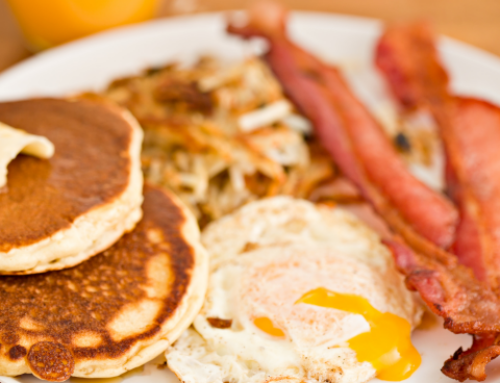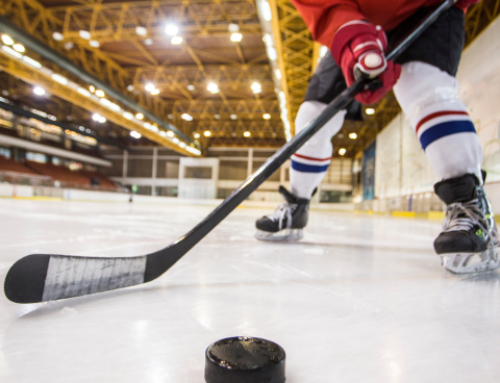Denver Nuggets Strength Coach Steve Hess Explains How Basketball Players Should Eat
![]()
Basketball at the highest competitive level involves much more than practice (insert Allen Iverson joke here). You need to address basketball nutrition very intentionally, so that you can be at your best when it matters most, during games.
RELATED: Sports Dietitians Answer Their Favorite Athlete Nutrition Questions
I recently had the opportunity to talk nutrition with Steve Hess, director of player performance for the Denver Nuggets and an ambassador for MET-Rx. He addressed the major factors in developing a nutrition program that will help you, whether you’re competing in college, high school or simply looking to get in better shape.
Q: How important is nutrition for players at the NBA level, and how do teams support them at this area?
Steve Hess: Appropriate nutrition is imperative for all athletes, and it is essential for NBA players. We precede any application of nutrient manipulation by testing all of our players. Tests include food allergies and individual physiological profiles. Once we have an individual’s results, we are able to prescribe an adequate nutritional plan. This is done with input from a physician and a nutritionist. We then apply the information into the preparation of his food, which contains the appropriate amounts of macro and micronutrients to sustain his individual goal of improved performance through nutrient-dense food.
RELATED: 5 Simple Nutrition Rules Every Athlete Should Follow to Improv Sports Performance
Do the nutrition plans change from the off-season to the season?
SH: Each individual’s plan changes constantly, depending on the load required by his body, his response to the nutrients provided, and the obvious attempt to continually improve the way he feels and performs.
Are there any general nutrition guidelines players should follow?
SH: It is of huge importance that players understand that certain foods inflame their bodies. Inflammation in the body hinders recovery. A great example of this is processed sugar. The most important message that I can give to players is that the majority of their calories should come from real, dense, high quality food, which they have prepared to enhance the absorption rate of those foods. Every meal must be prepared as part of the entire daily structure, remembering that we want to use our food to replenish, repair and recover. A huge part of a successful nutritional program must include appropriate hydration through water. It is also important to understand that feeling good is part of an appropriate nutritional profile.
What should a player eat for his pre-game meal, and how long before a game should he eat that meal?
SH: Pre-game meals should be completed one hour prior to activity. The exact absorption rates for best performance is largely dependent on the individual and what he or she consumes. Recommendations would be chicken and rice, a cup of mixed fruit and water. For the picky eater, you may want to try a PB & J sandwich, including high quality ingredients—whole grain bread, organic and real fruit-based jam with no added sugars, almond butter or natural peanut butter, mixed fruit and 12 ounces of water. The pre-game meal must provide adequate energy, reduce gastric distress and increase player performance.
Players must avoid fried foods—classic traditional American foods such as burgers, wings, chicken tenders and fries. These particular food choices create poor digestion, gastric distress, decrease readiness and promote inflammation.
RELATED: The One Nutrition Mistake Every Young Athlete Makes
What about guidelines for the post-game meal?
SH: The post-game meal is used to restore energy stores, reduce soft tissue breakdown, reduce total body inflammation and promote the rebuilding process. A whey and fruit smoothie may include tart cherry juice, grilled salmon, yams, broccoli, and a dark, leafy green salad with a teaspoon of olive oil and vinegar, and 8 ounces of water.
How important are supplements for today’s players?
SH: Supplements are part of a successful nutritional profile. It is impossible to obtain all of your nutrients from food. The majority of your nutrients should come from foods, but a well-designed supplement program enhances the effectiveness of the nutritional program exponentially.
Do the supplements need to be approved by the team or league?
SH: Supplements have to be within NBA guidelines, and we involve our nutritionist and physician before we introduce any supplements.
What type of supplements do you recommend for players to consider?
SH: The basic supplemental program we encourage our players to include in their nutritional profile is a multi-vitamin, multi-mineral, and the appropriate Omegas. We also encourage players to have a glycogen replenishing drink, in the form of a shake, 40 minutes post-activity. We also introduce essential amino acids post-workout. We provide an electrolyte replenishing drink during activity and finally a whey casein protein shake before bed.
All programs are individually designed, but this is a broad look at what we have found effective. Once again, we fully understand that the heart of our nutritional profile consists of real, appropriately prepared, nutrient-dense food. And finally, I am a true believer in all Met-RX products as I have had nothing but success with them for the last five years.
RECOMMENDED FOR YOU
MOST POPULAR
Denver Nuggets Strength Coach Steve Hess Explains How Basketball Players Should Eat
![]()
Basketball at the highest competitive level involves much more than practice (insert Allen Iverson joke here). You need to address basketball nutrition very intentionally, so that you can be at your best when it matters most, during games.
RELATED: Sports Dietitians Answer Their Favorite Athlete Nutrition Questions
I recently had the opportunity to talk nutrition with Steve Hess, director of player performance for the Denver Nuggets and an ambassador for MET-Rx. He addressed the major factors in developing a nutrition program that will help you, whether you’re competing in college, high school or simply looking to get in better shape.
Q: How important is nutrition for players at the NBA level, and how do teams support them at this area?
Steve Hess: Appropriate nutrition is imperative for all athletes, and it is essential for NBA players. We precede any application of nutrient manipulation by testing all of our players. Tests include food allergies and individual physiological profiles. Once we have an individual’s results, we are able to prescribe an adequate nutritional plan. This is done with input from a physician and a nutritionist. We then apply the information into the preparation of his food, which contains the appropriate amounts of macro and micronutrients to sustain his individual goal of improved performance through nutrient-dense food.
RELATED: 5 Simple Nutrition Rules Every Athlete Should Follow to Improv Sports Performance
Do the nutrition plans change from the off-season to the season?
SH: Each individual’s plan changes constantly, depending on the load required by his body, his response to the nutrients provided, and the obvious attempt to continually improve the way he feels and performs.
Are there any general nutrition guidelines players should follow?
SH: It is of huge importance that players understand that certain foods inflame their bodies. Inflammation in the body hinders recovery. A great example of this is processed sugar. The most important message that I can give to players is that the majority of their calories should come from real, dense, high quality food, which they have prepared to enhance the absorption rate of those foods. Every meal must be prepared as part of the entire daily structure, remembering that we want to use our food to replenish, repair and recover. A huge part of a successful nutritional program must include appropriate hydration through water. It is also important to understand that feeling good is part of an appropriate nutritional profile.
What should a player eat for his pre-game meal, and how long before a game should he eat that meal?
SH: Pre-game meals should be completed one hour prior to activity. The exact absorption rates for best performance is largely dependent on the individual and what he or she consumes. Recommendations would be chicken and rice, a cup of mixed fruit and water. For the picky eater, you may want to try a PB & J sandwich, including high quality ingredients—whole grain bread, organic and real fruit-based jam with no added sugars, almond butter or natural peanut butter, mixed fruit and 12 ounces of water. The pre-game meal must provide adequate energy, reduce gastric distress and increase player performance.
Players must avoid fried foods—classic traditional American foods such as burgers, wings, chicken tenders and fries. These particular food choices create poor digestion, gastric distress, decrease readiness and promote inflammation.
RELATED: The One Nutrition Mistake Every Young Athlete Makes
What about guidelines for the post-game meal?
SH: The post-game meal is used to restore energy stores, reduce soft tissue breakdown, reduce total body inflammation and promote the rebuilding process. A whey and fruit smoothie may include tart cherry juice, grilled salmon, yams, broccoli, and a dark, leafy green salad with a teaspoon of olive oil and vinegar, and 8 ounces of water.
How important are supplements for today’s players?
SH: Supplements are part of a successful nutritional profile. It is impossible to obtain all of your nutrients from food. The majority of your nutrients should come from foods, but a well-designed supplement program enhances the effectiveness of the nutritional program exponentially.
Do the supplements need to be approved by the team or league?
SH: Supplements have to be within NBA guidelines, and we involve our nutritionist and physician before we introduce any supplements.
What type of supplements do you recommend for players to consider?
SH: The basic supplemental program we encourage our players to include in their nutritional profile is a multi-vitamin, multi-mineral, and the appropriate Omegas. We also encourage players to have a glycogen replenishing drink, in the form of a shake, 40 minutes post-activity. We also introduce essential amino acids post-workout. We provide an electrolyte replenishing drink during activity and finally a whey casein protein shake before bed.
All programs are individually designed, but this is a broad look at what we have found effective. Once again, we fully understand that the heart of our nutritional profile consists of real, appropriately prepared, nutrient-dense food. And finally, I am a true believer in all Met-RX products as I have had nothing but success with them for the last five years.
[cf]skyword_tracking_tag[/cf]










